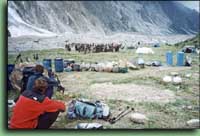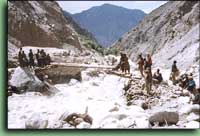Dusharin: It took us less than a day
to travel from Islamabad to our place of
destination. It was a rather narrow road with sharp bends. Having passed a village called
Chilas, we stopped at the gap that leads to Nanga Parbat. We unloaded the luggage and
looked around. A huge crowd of people started gathering around. They all seemed to be our
potential porters. We looked through the luggage and counted it to find out the number of
porters needed. Then the liaison officer and Samandar Khan were sent to control the
situation. The Ministry of Tourism sent Samandar Khan to be a cook assistant. He turned
out to be the local habitant who helped us a lot with the porters. He conducted the
process. |

Waiting for porters
|
|
Then unusual things started happening. Some people walked up to look at the luggage, but
we and the liaison officer tried to send those people away. They started forming groups
and discuss something. The crowd was growing. Then there was a real fight with stones.
People tried to stop it. It was awful to look at. There wasn't any control of the crowd.
People were aggressive. I didn't know what it would lead to. We didn't know the language
and couldn't understand the subject of the fight. Maybe the quarrel was about who will act
as porters. It is understandable, because the job provides money on which to live. To our
regret, such a competition doesn't cut the price. There aren't many expeditions here and
the price is always high. |
Finally, they calmed down. The liaison officer made an announcement and they started
turning in the name lists. By that time I had the list of the luggage contents and their
number. The liaison officer started filling the list with the names he got from the
serdars. The serdars are the leaders of small groups (10 to 12) of porters. It is more
likely that those are the family clans with the representatives who can at least give
signatures. Actually they promote a person who is more active and who is able to get more
profit out of the negotiations. Such people who were strong and active turned in the
lists. The liaison officer subscribed a certain part of the luggage to a certain person.
The process started. When the name of a person was cried out, he went up to pick his part
of the luggage. It didn't really matter who would deliver the luggage to the base camp. We
paid each porter 1000 rupees in advance. Every serdar got money for his group. Then he was
surrounded by other porters. They were trying to divide the money. There was a lot of
quarreling and swearing. It was kind of unusual and funny for us to witness.
Finally there were just gasoline and kerosene containers left. We asked one group to
transport it, but they rose up in rebellion at the idea and required an extra payment.
Samandar Han and the liaison officer suggested Carlos to increase the amount up to 50$.
Carlos was firm and didn't change the conditions. Then Samandar Han asked us to leave him
so that he could solve the problem himself. We crossed the road and waited. For thirty
minutes there were quarrels about the containers. Finally some people picked them. Those
who didn't get to carry the luggage were sitting on the side watching the process. We
couldn't understand the way they divided the luggage. One third of the people who came
over got a job. The others were sitting the whole day and did nothing.
Sometime before evening everything calmed down. Some people put the luggage upon donkeys,
others carried it themselves. Some people shared their part with two or three others. The
luggage was spread over the whole gap. We could see the luggage of the expedition and then
suddenly we couldn't. What happened to it, where was it? We didn't know. We didn't take
part in that process. Only Allah could say whether we would get it again up there or not.
We went up the path. It was drizzling. Before, when we were on the road, there was a dust
storm. The weather was gloom and severe. Nature was severe too. The situation was not a
nice one. In a while some strangers appeared asking questions. Some of them had guns. It
was very strange.
Not being in a hurry we reached the base camp. It was at 4,100 meters. By the time we got
there, the luggage had been delivered. People had been waiting for us. Carlos made up a
table, took the papers and started taking the luggage from the groups. Each porter had to
turn in the luggage when his name and the number of the luggage was announced. We were
examining it and Carlos marked down the list of names. The quarrels started again. People
tried to ask for money. Finally, everything calmed down. Frankly, we were just worn
out by those people. We set the tents the same day. The luggage adventure
was over. Normal camp life started.
We paid Samandar Khan for his service. He helped us with the porters. He knew English and
they didn't. So, the luggage was brought to the base camp without many problems. Of
course, there were some strikes and quarrels, but he'd done a good job. I think, that he
really earned his 2000 rupees that he had paid for the job. He thanked us. I asked
him:" And where is the goat that you promised to bring us?" - "Here it
is." He asked a porter to bring it. We tied it. So, we had meat. Immediately I paid
2000 rupees for it, and we just let the goat eat the grass.
Porters are very expensive to hire in Pakistan. The trip is not difficult. It takes the
porters 3 days to cover the way from Chilas to the base camp. And it really doesn't take
much effort. The height is rather low and they just carry 25 kg each. Actually, all the
luggage can be carried by the animals. The porters try to prolong the passing. It is
understandable: they get $45 for a move. It is a lot of money for them. They don't have
other jobs, and it is almost impossible to live like farmers. That is why there is
competition for the right to carry the luggage, and the prices are high.
The role of the liaison officer is very important in such situations. A man who is
respected by the locals is needed. You must know such a man. Other wise, there can be a
tragedy. People behave just like kids here. They don't try to understand what is going on.
They are not firm, and we just don't know how to communicate with them. One can make the
whole crowd move, and you can't control it. While they try to divide the money up they
forget about respecting each other. The Muslim rules stop working when the crowd starts
moving.
Here the strongest wins. |
We were lucky to have Samandar Khan with us. He took the role of a manager of the serdars,
and controlled the caravan. He is a calm and an easy going person. He is fluent in
English. He controlled the people and calmed down the quarrels. They took him as
"their man" which defended their interests. But we also had some problems with
him. Each day he told us of new requirements that the porters declared. Carlos was firm.
Otherwise there would be some consequences of that blackmail. Having heard new
requirements, Carlos said that we had set the amount of money already and there could not
be any changes. Just the usual mess. Carlos promised Samandar Khan that if he managed to
move to the destination, we would had paid him 2400 rupees. Serdars don't carry the
luggage. They just walk along with their porters and receive (as do the porters) 1800
rupees. That's all. We promised to give Samandar Khan more. He appreciated that and did
his job well. The luggage wasn't seriously damaged.
| |

Bridge on approach to the Base Camp
|
|
|
